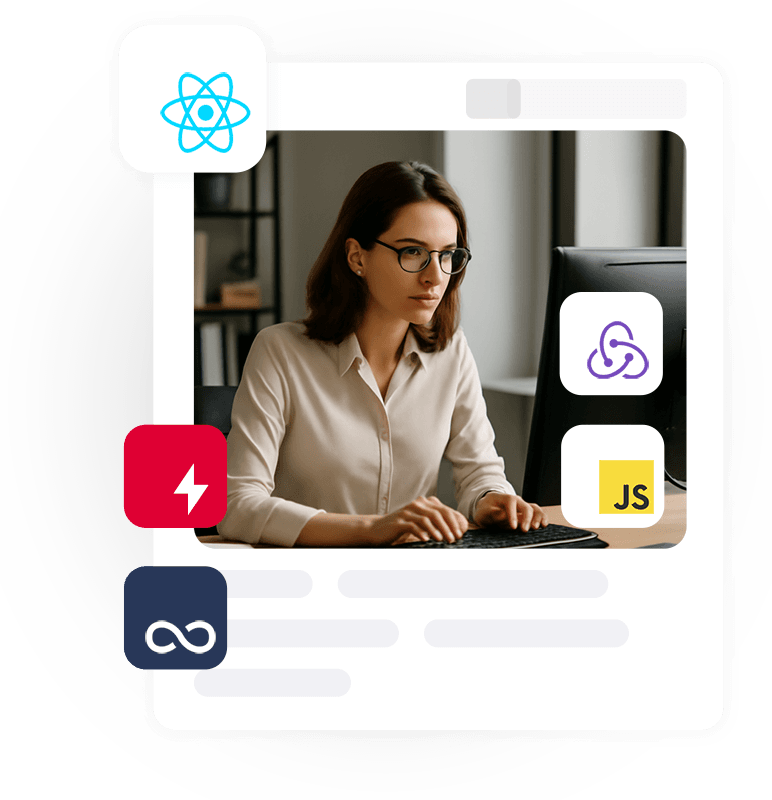
Next.js Security Best Practices for eCommerce Developers
Security is critical for modern eCommerce platforms. This guide explains practical Next.js security best practices to help developers protect data, payments, users, and business operations.
Seamless team integration
Scalable solutions
Agile, fast delivery
Ongoing support
High-performance apps
On-time, on-budget delivery

ReactJS developers build highly scalable frontends by leveraging component-based architecture and efficient state management, ensuring applications grow seamlessly.
Expert ReactJS developers create performant and maintainable user interfaces, enabling your applications to handle increasing user loads and complex functionalities.
Our ReactJS developers craft powerful, dynamic frontends, leveraging the framework's versatility to build high-performance applications.
We ensure seamless user experiences and scalable solutions, tailored to your unique business requirements.
Our developers build responsive, scalable ReactJS web apps tailored to your business objectives, ensuring high performance and adaptability.
Scalable and maintainable solutions
High-quality code with robust performance
Seamless integration with third-party services
Continuous support and maintenance
Transparent project tracking and reporting
Optimized user experience and interface design
Dedicated project management for timely execution

Our ReactJS developers possess deep expertise across the entire React ecosystem, including state management libraries like Redux and Context API, and modern tooling like Webpack and Babel.
The team delivered high-quality work that met our expectations in terms of design and functionality.
Join Dappinity to work at the forefront of digital innovation, collaborating with top-tier tech talent on meaningful projects for global clients. We offer a flexible, remote-friendly work environment, competitive compensation, and clear career growth opportunities. At Dappinity, you’ll enjoy continuous learning, mentorship, and recognition in a collaborative, inclusive culture that values creativity, impact, and professional development. Elevate your career while shaping future-ready solutions with us.
Dappinity provides expert ReactJS Developers offering scalable, innovative, and client-focused solutions while ensuring high quality and timely project delivery.
The dedicated ReactJS Developers team at Dappinity delivers innovative, scalable, and secure solutions, ensuring seamless collaboration and future ready applications.

Tell us what you need - tech stack, experience, timelines.

We send you pre-screened developers matched to your needs.

You interview. You decide. Start in as little as 72 hours.

Easily scale up or down. We stay flexible as you grow.
Hiring ReactJS developers can be flexible, depending on your project needs:
Choosing the appropriate development methodology for your ReactJS project is key to successful delivery. Here’s how different methodologies impact ReactJS development:
Ideal for ReactJS projects that are dynamic and require constant changes based on user feedback or evolving requirements. Agile focuses on continuous iterations, making it suitable for rapidly changing or experimental projects.
A subset of Agile, Scrum is perfect for projects that need frequent updates and reviews. ReactJS development within Scrum is driven by short sprints, enabling teams to adapt to new features, bugs, and client feedback more effectively.
Best for ongoing, steady progress, Kanban emphasizes visualizing work and ensuring a smooth flow of tasks. It works well for ReactJS projects where there’s a need for a continuous build-and-deliver cycle and for teams that need to stay flexible without rigid sprint timelines.
To build efficient ReactJS applications, ensure your developer has the right skills:
Ensure top-notch quality in your ReactJS projects with these best practices:
Ensuring strong security and IP protection when hiring ReactJS developers is essential:
When considering ReactJS development, think about your project’s scale and requirements:
Great for small projects, quick fixes, or one-off feature developments. Freelancers are more flexible, cost-effective, and quick to hire but may lack long-term availability.
Ideal for larger, long-term projects requiring consistent development, deep involvement, and a higher level of commitment. Dedicated developers offer continuous support and can evolve with your project’s needs.
Partner with Dappinity to build high-performing, scalable applications using ReactJS. Whether you're creating a SaaS platform, interactive dashboard, or eCommerce frontend, our expert developers deliver clean, efficient, and robust solutions built for modern users.
 Transparency
Transparency Strict Privacy Assurance with NDA
Strict Privacy Assurance with NDA Talented Team of Developers
Talented Team of Developers 12 Months Free Support
12 Months Free Support Smooth Collaboration & Reporting
Smooth Collaboration & Reporting On time Delivery, No Surprises
On time Delivery, No Surprises Efficient & Adaptive Workflow
Efficient & Adaptive WorkflowHiring a ReactJS developer from Dappinity brings several advantages, including high-performance and scalable web applications. Our developers build responsive, dynamic single-page applications (SPAs) with React, ensuring smooth user experiences. You’ll benefit from expert use of React’s virtual DOM for faster rendering, reusable components, and modern development practices like server-side rendering (SSR) and static site generation (SSG). We also ensure your app is highly maintainable, well-tested, and scalable.
In large applications, state management can become complex. ReactJS developers often use state management libraries like Redux, MobX, or React's Context API to manage global and local application state. These tools allow for predictable state handling, easier debugging, and better control over application flow. Our developers can integrate these solutions efficiently to ensure your app remains fast, scalable, and easy to maintain as it grows.
Dappinity ReactJS developers leverage modern tools and libraries to improve efficiency and quality, such as:
These tools help streamline development and ensure high-quality, maintainable applications.
Dappinity’s ReactJS developers follow best practices for writing clean, modular code that is easy to maintain and scale. This includes breaking down the application into reusable components, adhering to the DRY (Don't Repeat Yourself) principle, and following consistent code styles. We also emphasize automated testing, using unit tests, integration tests, and end-to-end tests to ensure the application is robust and bug-free. Code reviews and pair programming are also part of our development process to ensure code quality.
Yes, Dappinity ReactJS developers have extensive experience in integrating third-party services and APIs. Whether it’s integrating payment gateways, social media logins, analytics services, or external data sources, our developers ensure seamless API connections and smooth data handling. They focus on error handling, security, and optimizing API calls to ensure performance doesn’t suffer as you scale.
ReactJS developers at Dappinity optimize application performance by utilizing techniques such as:
ReactJS offers several benefits, such as:
Dappinity ReactJS developers implement responsive design using CSS frameworks like Bootstrap, Material-UI, and custom media queries to ensure your application looks and works great across all devices. They use flexbox and CSS grid to create flexible layouts and ensure the UI adjusts to various screen sizes and resolutions, providing a seamless user experience on desktops, tablets, and mobile phones.
Hiring a ReactJS developer from Dappinity is a simple process:
1. Share your project requirements, desired skills, and technical stack.
2. Receive a list of pre-vetted ReactJS developers with matching expertise.
3. Interview and select the ideal developer for your needs.
4. Start your project with a smooth onboarding process and continuous support from our team.







